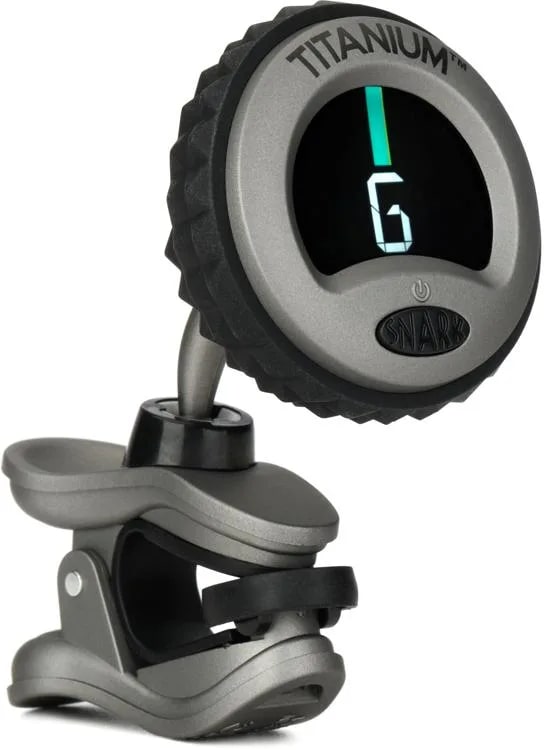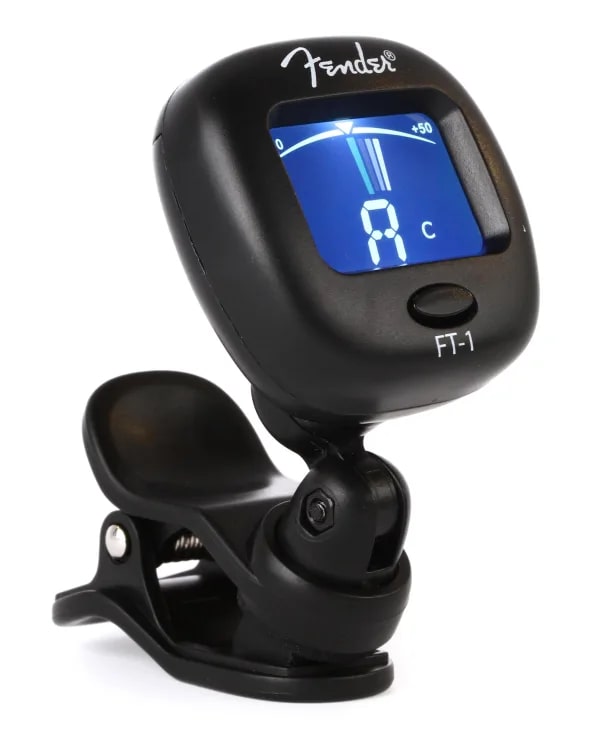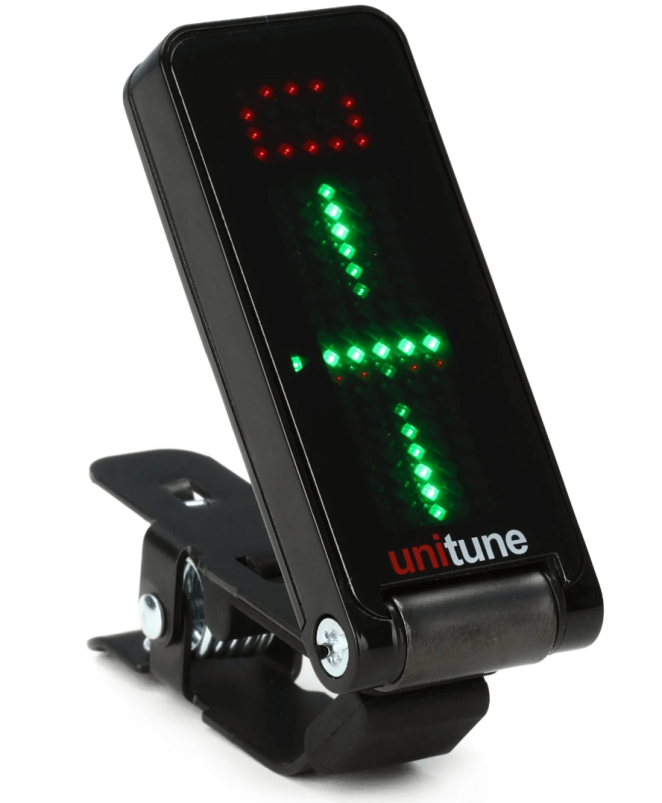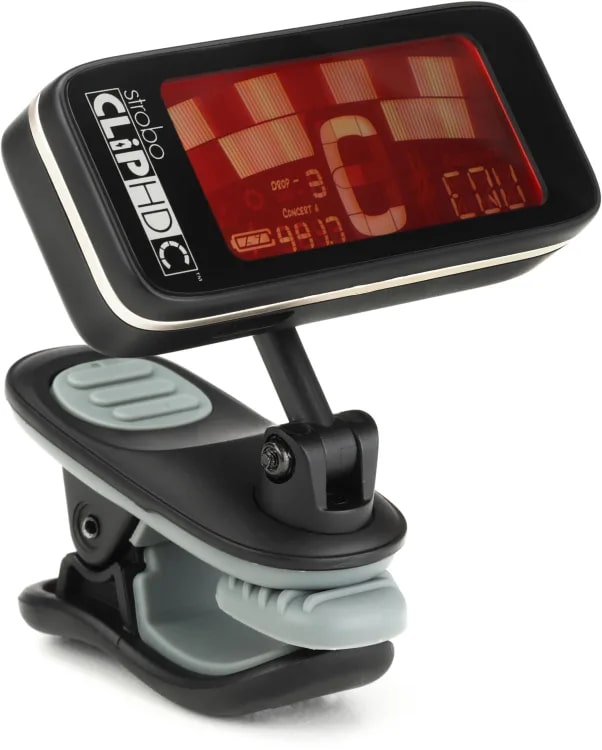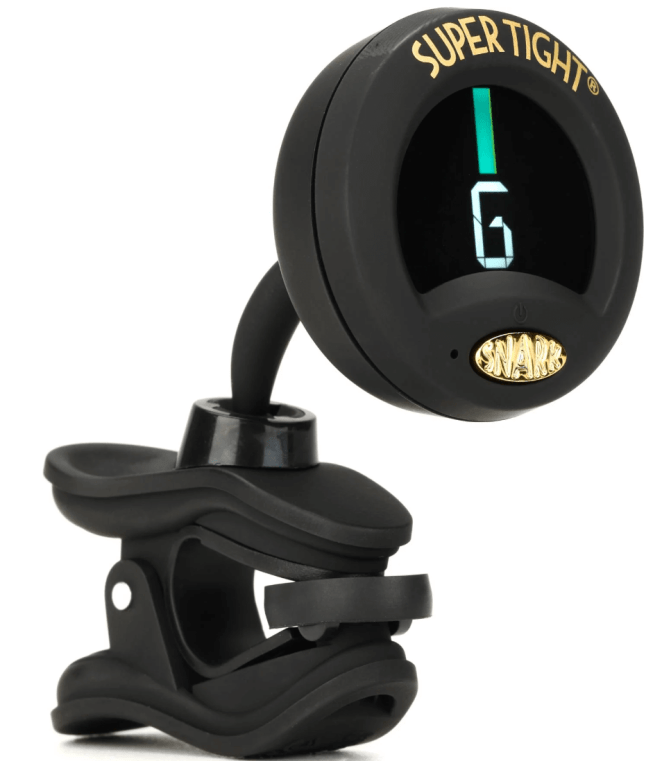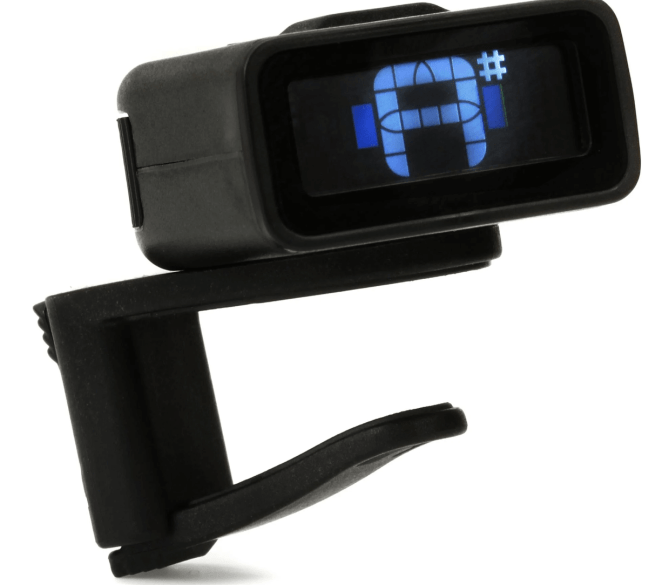When you buy through our links, we may earn an affiliate commission.
Keeping your guitar in tune is vital for good performance and practice. No matter how skilled you are at playing, you're going to sound like an amateur if you play an out-of-tune guitar.
This is why picking a good clip-on guitar tuner is so important. These devices stay attached to your guitar and are ready to help you get in tune any time, making sure your playing sounds the best it can.
Whether you're playing an acoustic guitar or an electric, you're going to need an accurate tuner that has all the functions that suit your setup and playing style.
With such a wide range of clip-on guitar tuners on the market, it can be hard to know which is the most suitable for your needs. So we put together this guide to show you the best options on the market today. We'll also give you a buyer's guide, which discusses all the important specs and features you should consider when choosing a tuner.
One of our favorite models is the Taylor Beacon. This gadget is more than just a tuner–it has a built-in metronome (with multiple time signatures), two timers, and even a flashlight. Surely this is the perfect practice accessory? The tuning is also mega-accurate, which is the main thing, isn't it?
This might not be suitable for all of you, so make sure you check out the rest of this article for the full lineup!
Quick Summary of the Best Clip-On Guitar Tuners
- Taylor Beacon (Swiss-Army Tuner)
- Snark ST-8 Titanium Super Tight (Stage Insulated)
- Fender FT-1 Pro (Cheap but Cheerful)
- TC Electronic UniTune (Dazzling Display)
- Peterson StroboClip HDC (Super-Pro Grade)
- Snark ST-8 Super Tight Chromatic Tuner (Affordable and Tight)
- D'Addario PW-CT-12 Micro (Stealthy Tuning)
Best Clip-On Guitar Tuners
If you're on the hunt for a new clip-on guitar tuner, the below list shows you the best on the market. We included a wide range that covers all the budget and skill levels.
Swiss-Army Tuner
SPECS
- Type: Chromatic
- Display: LCD
- Powering: USB Rechargeable battery
- Modes/Features: Chromatic, Guitar, Bass, Violin, Ukulele, Multi-time signature metronome, timers, flashlight
This tuner is more than a tuner–it's a metronome, timer, torch, and tuner all in one. Sure, it costs a bit more than your basic models, but it bundles in so many features that the price tag is easily worth it.
The Beacon's accuracy is super high and can't be faulted. The tuning display is easy to read, and you won't have any trouble making sure your strings are tightened to the right pitch. It resists external vibration well, and the rechargeable battery has a fantastic lifespan.
Now for the fun stuff. This tuner has a built-in metronome that offers 12 different time signatures and can tick from anywhere between 30 to 208 BPM, which is more than enough. It has two independent timers which are great for allocating practice sessions. Finally, it has a built-in flashlight which can be a lifesaver on a dark stage.
This is easily our favorite tuner– it's closer to a James Bond gadget than a guitar tuner, but it has all the tuning functionality you could ever ask for! This is a great guitar accessory and makes both performance and practice sessions easier.
Stage Insulated
SPECS
- Type: Chromatic
- Display: HD 360 degree LCD display
- Powering: Rechargeable USB-B Micro cable
- Modes/Features: External isolation, guitar, bass, ukulele, and more
As soon as you pick this device up, you can instantly tell that it's sturdy and well-shielded. The built-in titanium and rubber dampening help to prevent interference from external vibrations. This ensures that the tuner performs perfectly in loud environments, which means your tuning won't be interfered with by a bass player riffing loudly next to you.
The interface is simple and easy to understand with plenty of brightness to read on any stage, indoors or outside. It has an internal battery that is recharged with a USB cable and has plenty of battery life.
If you're looking for a more durable and isolated tuner to use on a loud stage, something like this model should be your first choice.
Cheap but Cheerful
SPECS
- Type: Chromatic
- Display: Simple LCD bars
- Powering: 1 x CR2032 battery
- Modes/Features: Guitar, Bass, Ukulele, Violin
If you're looking for a no-frills, basic chromatic tuner under $10, this is the best it comes. Designed for tuning electric and acoustic instruments, you can use this for guitars, basses, ukuleles, or violins.
The display is simple and bright. It doesn't have any distracting extra features and is clear enough to read on-stage without much effort.
Sure, this tuner doesn't have much to talk about. It's accurate enough for most players and works well to get your guitar sound in tune. The most annoying thing is the battery, which can require a bit of hunting to buy in stores (although you can find it easily enough online).
Another gripe is that it doesn't show you which octave the note is in, but this is only something that a pro might worry about.
For beginners (or those who want something a bit easier to use than their phone tuner) this is the cheapest place to start.
Dazzling Display
SPECS
- Type: Chromatic
- Display: Ultra-bright adaptive LED
- Powering: 1 x CR2032 battery
- Modes/Features: Guitar, bass, ukulele and others
The standout feature of this tuner is its clear and adaptable display. Using 105 ultra-bright LEDs, it's incredibly easy to read, no matter how bright your environment is. Additionally, it can be used in either 'landscape' or 'portrait' orientation - and will automatically switch itself to the right position.
It offers ±0.02 cent accuracy, equating to 1/500th of a semitone–meaning you're pretty much guaranteed to be spot on when you tune to this. It uses a small battery rather than a rechargeable one, which would've been nice at this price range, but it isn't a deal breaker.
Super-Pro Grade
SPECS
- Type: Chromatic
- Display: HD Advanced LCD & Strobe Mode
- Powering: Built-in USB-C rechargeable battery
- Modes/Features: 50+ Tuning modes, Peterson Connect App, Color Change Modes
Looking for a clip-on guitar tuner with all the bells and whistles? Look no further than this. The Peterson Stroboclip HD-C is an upgrade of the Peterson StroboClip HD - taking all the reliability and flexibility of the original model and bundling in some new extra features.
It has a stunning display screen, a huge range of tuning modes, and is incredibly accurate. There really isn't much to fault with this other than the price tag. This is a great choice for professional musicians who need pin-point tuning accuracy and also like to use microtonal and non-conventional tunings.
You can also get deeper into the customization and settings thanks to the Peterson Connect app.
Affordable and Tight
SPECS
- Type: Chromatic
- Display: 360 degree LCD
- Powering: 1 x CR2032 battery
- Modes/Features: Guitar/Bass, Ukulele
Snark has a range of clip-on tuners on its roster, and their ST-8 hits the sweet point between high performance and low price.
With a rotatable and angleable neck, the display has a flexible range of viewing positions, meaning you won't have to crane your neck to tune up.
It's as accurate as most players will need and responds quickly to your playing. Again, this uses one of those small batteries which can be hard to find compared to AA and AAA.
Stealthy Tuning
SPECS
- Type: Chromatic
- Display: Multi-color LCD
- Powering: 1 x CR2032 battery
- Modes/Features: 410-480Hz calibration range
This is one of the more stealthy tuners on this list. Thanks to its small profile, it's hard to see on stage. It also has a swiveling clip that can easily be moved to the front or back of your instrument.
The tuning performance is up to scratch, and it reads the pitch with decent accuracy. The display itself is nicely backlit and easy to read. The indication might not be as immediately intuitive as other models, but you get used to it pretty quickly.
Best Clip-On Guitar Tuners Buyer's Guide
There are a lot of things to think about when choosing new clip-on guitar tuners. From tuning accuracy to the clip style, and the interface appearance - you have a range of decisions to make. This section highlights all the important considerations, to help you choose the perfect fit.
Tuning Modes, Ranges, Methods, Accuracy and Calibration
The tuning element of the tuner has several specs and questions.
First, you can find chromatic or polyphonic tuners - each offering a slight variation on how they work. Chromatic tuners are the most common, and simply identify the single loudest note at a time - these are perfect for most users.
Polyphonic tuners are a more modern type. These magical devices can detect the tuning of all 6 strings at once, letting you quickly see if your whole guitar is in tune. These are more expensive and harder to understand, but can be useful for some players.
Some tuners come with a Strobe Tuning Mode. A Strobe tuner will make the sound of the selected note, which means you can easily hear the difference if your string is out of tune. This can be a lifesaver and helps to make sure that you are getting things perfect, as sometimes the display might be a tiny bit off, or hard to see if it's in the right place.
The tuning range is only a minor consideration, as all of the tuners on this list cover the natural range of acoustic and electric guitars.
However, if you want to use drop tuning, or want to use your tuner for other instruments with a wider chromatic tuning range (like bass guitars), make sure that the tuner can reach from low to high. If you're looking into strobe tuners, make sure the strobe tuning range specification meets your needs as well.
If you play in alternative tunings, then you'll want something that can handle that.
Tuning Accuracy is another consideration. For most players, all the tuners on this list will be accurate enough, as they all have a sub-cent tuning.
However, for more virtuosic players, you'll want to look at the more expensive models on this list. They offer accuracy up to 0.1 cents (1/1000th of a semitone). These are capable of microtonal tuning, which might be needed for more advanced playing styles.
User-Friendly Interface and Display
You'll find clip-on guitar tuners come with a wide range of interface and display styles. From a simple +/- indicator to a fully-featured LCD display screen, and everything in between.
In general, better displays cost more money, but are more accurate to read, are easier to see on stage, and can show you additional useful information.
The best choice here depends on how important guitar tuning is to you, and how much money you have to spare. For beginners, you're probably going to be fine with a basic bar indicator.
But professionals and performers will definitely find that an expanded display is a worthy investment and helps them to get the perfect pitches from their instrument.
Powering: Battery Type, Life, and Energy Saving
One of the most important things to think about is the powering of the tuner - particularly if you are a performing musician and use your device on the go. There are several choices and considerations here.
Battery Type - Many guitar tuners use external batteries, with ranging types. Most use either AA or AAA, but some cheaper models use those obscure smaller batteries. Obviously, AA and AAA batteries are easier to find - which can be a lifesaver when you're touring.
Also, you can use rechargeable AA and AAA batteries. This type of power is useful for buskers and performers because you can just swap out the dead batteries with some fresh ones in the middle of a show.
Rechargeable? Some tuners come with a built-in, rechargeable battery. This has pros and cons. The advantage is that you don't need to worry about buying and carrying around extra batteries (or a battery charger). These usually have some kind of USB charging cable which is easy enough to plug into a charging device.
The main downside is that you can't swap the batteries out mid-performance - which could leave you in a pinch during a show. You have to make sure they're charged up in advance, but they are a more seamless solution - and tend to last longer.
Power Saving Features - Some devices come with smart power-saving features that help to extend the battery life. This is a nice addition, although not all have it. In essence, they'll automatically turn off after a couple of minutes of inactivity.
Clip Design and Attachment
The type of clip used is also something that requires a bit of thought, particularly if you plan on sticking it on a nice instrument.
Some clips are definitely better than others–and some are even at risk of scratching or damaging your instrument, so be careful when selecting your tuner.
Cheaper clips tend to use a rougher surface, which tends to be more of a threat to your guitar's finish and can leave marks, scratches, and dents.
If you want to avoid leaving any scratches on the surface of your guitar, make sure you opt for a non-marring clip type. These typically use rubber or felt linings to ensure that they won't leave a single mark on your instrument.
Frequently Asked Questions (FAQs)
Are clip-on guitar tuners any good?
Ultimately it depends on the quality of the product you are using, but in general clip-on guitar tuners are pretty decent. They are easy to use, portable, and usually pretty effective at helping you get your guitar in tune.
You can find some high-end models that have extra features, which can make your life even easier. Be warned though, some of the cheaper models have lower tuning accuracy, which can be a bit of a pain if you're trying to be precise about your tuning.
Do clip-on tuners work on stage?
For the most part, clip-on guitar tuners will work on stage - although it depends on how loud other instruments and speakers are, and what type of guitar you are playing. If you are playing an electric guitar on a loud stage with other musicians and heavy speakers, you might struggle with interference from other vibrations.
In this case, you might be better off looking at a guitar pedal tuner rather than a clip-on tuner, or pick up a Snark ST-8 Titanium Super Tight, which features a special insulated design that protects you from interference.
Are clip-on tuners more accurate than pedals?
Clip-on tuners can be very accurate, although, in comparison to pedals, they often have a lower performance.
This is because pedal tuners work with a direct audio signal from the guitar's output, while clip-on tuners depend on vibrations running from the strings, through the guitar's neck and headstock. This can make them prone to interference from external vibrations, where pedals are dealing with a purer signal.
That said, many high-quality clip-on guitar tuners have essentially perfect tuning performance.
Finally...
Now you are more than equipped to make an informed decision over which guitar tuner is the best for you. From the above list you will have no trouble finding the perfect model - and prepare to keep your guitar in pitch-perfect tuning.
The Taylor Beacon is one of our favorites. This is a fantastic investment to make for both beginner and pro guitarists alike.
First and foremost, it's a highly accurate tuner that helps you get the perfect pitch. Additionally, it comes with a built-in metronome for improving your timing, timers for keeping your sessions on time, and a flashlight for illuminating a dark stage. The battery is long and rechargeable - what more can you ask for in a guitar tuner?
